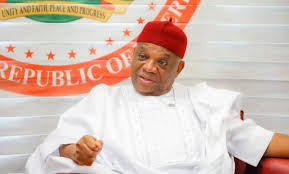Former Governor of Abia State and current senator, Orji Uzor Kalu, has said that the Igbo people are still being treated unfairly in Nigeria decades after the end of the civil war.
Speaking on Politics Today, a programme on Channels Television aired on Wednesday, Kalu said that the country is yet to fully integrate the Igbos and give them equal treatment like other ethnic groups.
“Since after the civil war, Igbos have not been fairly treated,” Kalu said. “I don’t hide in saying it. Nigerians need to reassure the Igbos and play by the rules so that everyone will be equal and the country can develop.”
He said the continued discrimination against the Igbos has discouraged many, including younger generations, and warned that such unfair treatment will slow down national development.
Kalu, who served as governor from 1999 to 2007, gave a personal example, saying his children were shocked by the negative remarks made about Igbos when they returned to the country.
“My children came back here, and when they went out to go around, they said, ‘Oh, the way they talk about Igbo people in this country’. I said, well, that is what it is,” he said.
He added that it is time for Nigerians to move past ethnic, religious, and tribal divisions and focus on building a united nation.
“Igbos have not committed any offense. I didn’t know how the civil war started, and I didn’t know how it ended. We should forget about that,” Kalu said. “Look at Rwanda, with all the hatred and war in the past they have moved forward. We should be able to do the same.”
The Nigerian Civil War, also known as the Biafran War, lasted from 1967 to 1970. The war began after the South-Eastern region, led by the late Chukwuemeka Odumegwu Ojukwu, attempted to break away and form the Republic of Biafra. The conflict ended in 1970 with a military victory for the Nigerian government, but the effects of the war and feelings of exclusion still linger in the South-East.

